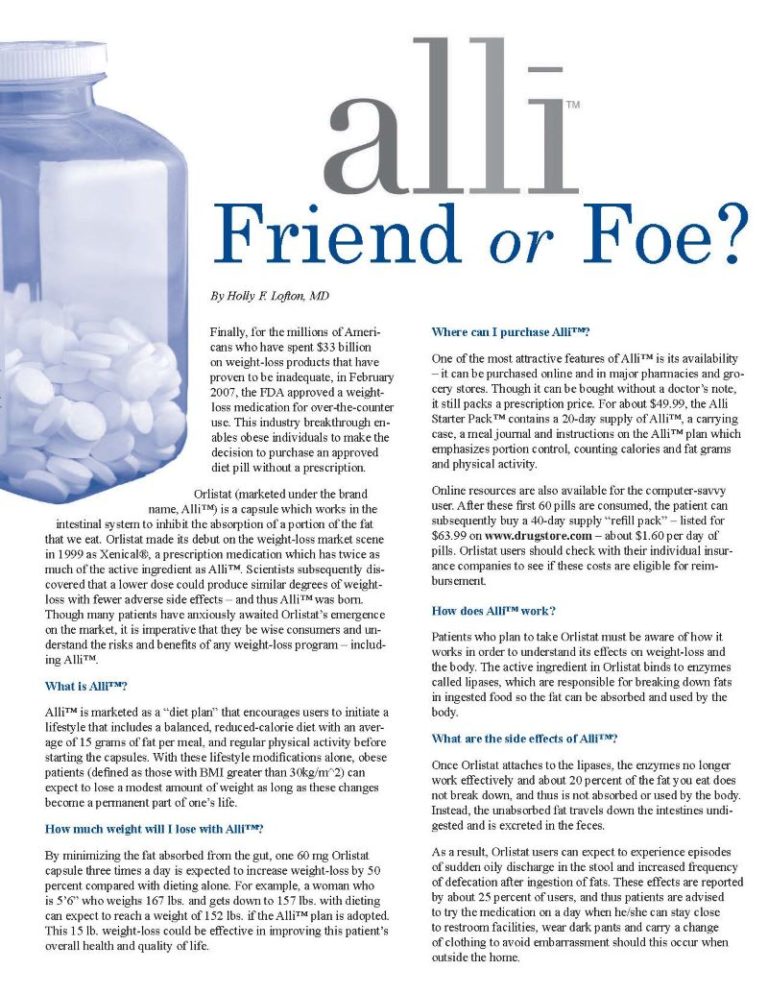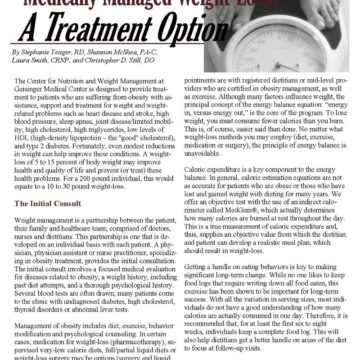alli – Friend or Foe?


By Holly F. Lofton, MD
Fall 2007
Finally, for the millions of Americans who have spent $33 billion on weight-loss products that have proven to be inadequate, in February 2007, the FDA approved a weight-loss medication for over-the-counter use. This industry breakthrough enables individuals affected by obesity to make the decision to purchase an approved diet pill without a prescription.
Orlistat (marketed under the brand name, Alli™) is a capsule which works in the intestinal system to inhibit the absorption of a portion of the fat that we eat. Orlistat made its debut on the weight-loss market scene in 1999 as Xenical®, a prescription medication which has twice as much of the active ingredient as Alli™. Scientists subsequently discovered that a lower dose could produce similar degrees of weight-loss with fewer adverse side effects – and thus Alli™ was born. Though many patients have anxiously awaited Orlistat’s emergence on the market, it is imperative that they be wise consumers and understand the risks and benefits of any weight-loss program – including Alli™.
What is Alli™?
Alli™ is marketed as a “diet plan” that encourages users to initiate a lifestyle that includes a balanced, reduced-calorie diet with an average of 15 grams of fat per meal, and regular physical activity before starting the capsules. With these lifestyle modifications alone, patients with obesity (defined as those with BMI greater than 30kg/m^2) can expect to lose a modest amount of weight as long as these changes become a permanent part of one’s life.
How much weight will I lose with Alli™?
By minimizing the fat absorbed from the gut, one 60 mg Orlistat capsule three times a day is expected to increase weight-loss by 50 percent compared with dieting alone. For example, a woman who is 5’6” who weighs 167 lbs. and gets down to 157 lbs. with dieting can expect to reach a weight of 152 lbs. if the Alli™ plan is adopted. This 15 lb. weight-loss could be effective in improving this patient’s overall health and quality of life.
Where can I purchase Alli™?
One of the most attractive features of Alli™ is its availability – it can be purchased online and in major pharmacies and grocery stores. Though it can be bought without a doctor’s note, it still packs a prescription price. For about $49.99, the Alli Starter Pack™ contains a 20-day supply of Alli™, a carrying case, a meal journal and instructions on the Alli™ plan which emphasizes portion control, counting calories and fat grams and physical activity.
Online resources are also available for the computer-savvy user. After these first 60 pills are consumed, the patient can subsequently buy a 40-day supply “refill pack” – listed for $63.99 on www.drugstore.com – about $1.60 per day of pills. Orlistat users should check with their individual insurance companies to see if these costs are eligible for reimbursement.
How does Alli™ work?
Patients who plan to take Orlistat must be aware of how it works in order to understand its effects on weight-loss and the body. The active ingredient in Orlistat binds to enzymes called lipases, which are responsible for breaking down fats in ingested food so the fat can be absorbed and used by the body.
What are the side effects of Alli™?
Once Orlistat attaches to the lipases, the enzymes no longer work effectively and about 20 percent of the fat you eat does not break down, and thus is not absorbed or used by the body. Instead, the unabsorbed fat travels down the intestines undigested and is excreted in the feces.
As a result, Orlistat users can expect to experience episodes of sudden oily discharge in the stool and increased frequency of defecation after ingestion of fats. These effects are reported by about 25 percent of users, and thus patients are advised to try the medication on a day when he/she can stay close to restroom facilities, wear dark pants and carry a change of clothing to avoid embarrassment should this occur when outside the home.
Though the side effect of sudden fatty discharge and possible abdominal discomfort seems untoward, many users have success in avoiding high fat foods even after discontinuing the drug because they create an association between eating fat and having an awkward accident. In clinical trials, only about 3 percent of patients stopped taking Orlistat because of this side effect. Patients who use Orlistat should also take a daily multivitamin that provides the recommended daily allowance of vitamins A, D, E, K, and beta carotene. These fat-soluble vitamins are not well absorbed in patients taking Orlistat.
Other patient-reported side effects include upper respiratory infections, headaches, stool incontinence and menstrual irregularities. Patients who have had certain types of kidney stones may have recurrences. Orlistat is not recommended for pregnant or breast-feeding women or those with a history of eating disorders.
You should contact your healthcare professional before starting Orlistat if you have previously had pancreatitis, gallbladder disease, or problems with digesting food in the past. Patients who have had organ transplants should not take this drug as it may interfere with anti-rejection medications. Patients who take any medications should make his/ her healthcare professional aware that he/ she is considering starting Orlistat before beginning the tablets so that appropriate dosage adjustments and monitoring can be arranged.
Finally, patients expecting Orlistat to be “the miracle pill” will likely be disappointed. This medication is best used in a patient highly motivated to lose weight and who is presently on a balanced, low-fat diet and who is regularly exercising. Maximum benefits are usually seen within the first six months, and its usefulness beyond four years has not yet been well studied. Patients are advised to adopt a healthy lifestyle while taking Orlistat and beyond to prevent weight regain. Furthermore, be sure to inform your healthcare professional if you are planning to take Orlistat so he/she can be of assistance in helping you achieve your goals while optimizing your overall health.
Pros and Cons of Alli™
Pros
|
Cons
|
*Per www.myalli.com™
About the Author:
Holly Lofton, MD, is currently a fellow in the Bariatric Medicine/ Nutrition program at Geisinger Medical Center under the direction of OAC Board of Director member Christopher Still, DO. Her primary interests are improving nutrition and activity profiles for patients with excess weight or obesity.
Resources:
1. www.myalli.com™
by Kendall Griffey, OAC Communications Manager Spring 2024 We have officially kicked off Your Weight Matters Regional…
Read ArticleTelemedicine became a popular tool during the pandemic because it allows healthcare professionals to provide medical care…
View Videoby Kendall Griffey, OAC Staff; and Chrystal Jones, OAC Staff Fall 2022 For over ten years, the…
Read Article










